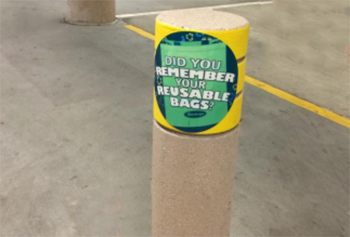By: Marjorie DePuy, Sr. Director, Supply Chain & Sustainability, and Farleigh Lichstein, Director, Education, FMI

FMI recently hosted a discussion featuring Ratio Institute, a nonprofit focused on achieving sustainable food retailing through expert collaboration, industry resources and practical tools. The discussion was designed to provide members of our sustainability community information on operational sustainability. Catrina Damrell, engagement manager with Ratio Institute, framed the conversation with a discussion around consumer interest in sustainability and how small changes can have big results.
The Case for Operational Sustainability in Food Retail
According to Porter Novelli’s 2021 Business Action for Climate Crisis Report, American consumers visit grocery stores twice per week, and:
- 80% believe companies have a responsibility to help solve the climate crisis.
- 75% want to hear more from companies on what they’re doing to solve the climate crisis.
- 68% believe they can make an impact on the climate crisis through sustainable purchases.
Explaining The Operational Sustainability Opportunity
Peter Cooke, director of programs and partnerships, explained the concept of operational sustainability for grocery retail, including the everyday workplace behaviors for staff that can have a significant impact on the bottom line for the overall store. There are also physical and technological investments that can be made to improve the infrastructure, for example, refrigeration innovations that emit less ozone-depleting compounds. But all of these changes, can add up to big cost savings.
Cooke walked attendees through visual examples of various ways to reduce product loss as well as your energy bills, by removing outdoor vending machines prone to freezing temperature, clearing off vents in the produce aisle, and diverting food scraps to composting. One retailer even sells their own brand of compost!
Viewers were also taken to the seafood display and shown iced and iceless options and then taken to the back of the house to discuss leak management and recycling practices. This short conversation included a host of financial hypotheticals to contextualize the impacts some of these practices can have. It concluded with a reminder of the impact of employee engagement in store level sustainability practices on absenteeism and profitability.
What’s Next?
When you talk to any retail staff working in the back room, they are more than happy to see surplus food donated and materials recycled and enjoy a little friendly competition if there are incentives involved. We’d recommend reaching out to the team at Ratio Institute to learn more about the new Food Retail Sustainability Certification and how it can help you take your operational sustainability to the next level.
We also recommend keeping in touch about the 2022 Energy and Store Development Conference. While we don’t have a date set yet, we can’t wait to see you all in-person to discuss topics such as this!
Sign up to receive notifications about the 2022 E+SD conference.


 Industry Topics address your specific area of expertise with resources, reports, events and more.
Industry Topics address your specific area of expertise with resources, reports, events and more.
 Our Research covers consumer behavior and retail operation benchmarks so you can make informed business decisions.
Our Research covers consumer behavior and retail operation benchmarks so you can make informed business decisions.
 Events and Education including online and in-person help you advance your food retail career.
Events and Education including online and in-person help you advance your food retail career.
 Food Safety training, resources and guidance that help you create a company food safety culture.
Food Safety training, resources and guidance that help you create a company food safety culture.
 Government Affairs work — federal and state — on the latest food industry policy, regulatory and legislative issues.
Government Affairs work — federal and state — on the latest food industry policy, regulatory and legislative issues.
 Get Involved. From industry awards to newsletters and committees, these resources help you take advantage of your membership.
Get Involved. From industry awards to newsletters and committees, these resources help you take advantage of your membership.
 Best practices, guidance documents, infographics, signage and more for the food industry on the COVID-19 pandemic.
Best practices, guidance documents, infographics, signage and more for the food industry on the COVID-19 pandemic.
